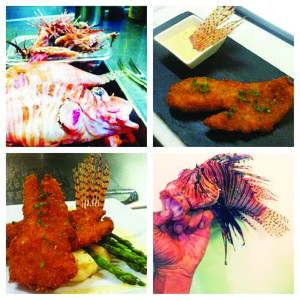 A series of public education and awareness initiatives about the Lionfish has resulted in a few restaurants now serving the fish in their establishments. According to reports, the Lionfish is now being served at the Straw Hat Restaurant, Tasty’s Restaurant and Mango’s Restaurant. The awareness raising initiatives were facilitated by the Department of Environment and the Department of Fisheries and Marine Resources in collaboration with the Anguilla Hotel and Tourism Association.
A series of public education and awareness initiatives about the Lionfish has resulted in a few restaurants now serving the fish in their establishments. According to reports, the Lionfish is now being served at the Straw Hat Restaurant, Tasty’s Restaurant and Mango’s Restaurant. The awareness raising initiatives were facilitated by the Department of Environment and the Department of Fisheries and Marine Resources in collaboration with the Anguilla Hotel and Tourism Association.
These agencies have stressed the need for fishermen and dive operators to target the population of lionfish as a means of reducing their impact on Anguilla’s ecologically important reef fish. The agencies have lobbied and conducted surveys with restaurant owners as a means of encouraging them to place the Lionfish on their menu. In an effort to assist restaurants, the agencies have also organized special sessions for chefs on the safe handling and preparation of the Lionfish.
One of the attendees of the training session, Chef Nick of the Straw Hat Restaurant stated that he was delighted to prepare the meat for his diners. He said that: “The meat is lovely, a mix between the texture of a small grouper and the sweetness of a red snapper. The fillets are a nice size and the overall process of cleaning them is not that difficult. It takes a little patience and time, but at this point it is very necessary. They are as versatile as a snapper. You can fry them whole, bread the filets, steam or grill them.”
Chef Dale of Tasty’s Restaurant states that he was happy to add the Lionfish as a catch of the day in his establishment. He noted that the Lionfish is a real delicacy, and stated that his patrons are making a demand for the said fish as they are always eager to have something new. He also confirmed that his patrons described the Lionfish as tasting like a grouper fish.
Apart from being served in restaurants, quite a number of fishermen and other residents are using the Lionfish for personal consumption. It was served by Keith Harrigan at the recent Agricultural exhibition and it was sold out as soon as it arrived.
The lionfish is native to the Indo-Pacific Ocean, but it has been introduced to the Atlantic Ocean and the Caribbean Sea in recent times. It preys heavily on the local fish stock and thus reduces the fishermen’s yield. The Lionfish has venom in its spines as a way of protecting it from predators. However, once the fish is captured, its venomous spines can be easily removed, and the fish can be prepared for consumption.
It is hoped that with a wider cross section of the restaurants and fishermen’s participation in serving and supplying the Lionfish, it will aid in the regional approach towards controlling and managing the population of the Lionfish within Anguilla and the Wider Caribbean.
(Published without editiing by The Anguillian newspaper.)







